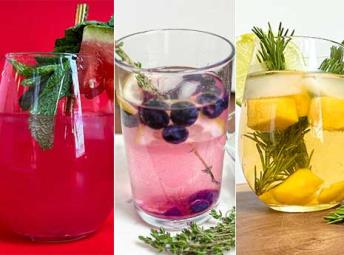As you get further chilled, you'll find yourself hopping from foot to foot and jumping around. This is Nature's way to get you to generate heat and warm your body.
If you become so cold that you start to shiver, these vigorous muscular contractions generate lots of heat—perhaps 400 calories per hour.
Such intense shivering quickly depletes your muscle glycogen stores and drains your energy. This is when you'll be glad you have some emergency food in your pocket!
What's Biggest Nutritional Mistake Athletes Make in the Winter?
Failing to drink enough fluids is a major problem among winter athletes—players, skiers, runners and winter hikers alike. Cold blunts the thirst mechanism; you'll feel less thirsty despite significant sweat loss (if you overdress), to say nothing of respiratory fluid loss.
That is, winter athletes need to consciously consume fluids to replace the water that gets lost via breathing. When you breathe in cold, dry air, your body warms and humidifies that air. As you exhale, you lose significant amounts of water.
Some winter athletes purposefully skimp on fluids because urinating can be problematic—too much hassle to shed layers of clothing (ski suit, hockey gear, snow pants, etc.) Yet, dehydration hurts performance and is one cause of failed mountaineering adventures.
What's Best Way to Eat to Warm Myself Up?
If you become chilled by the winter weather, as can easily happen if you:
- Wear sweaty, wet clothing that drains body heat
- Fail to wear a hat (30 to 40 percent of body heat can get lost through the head)
- Drink icy water (from a water bottle kept on your bike or outside pocket of your backpack when winter hiking)
... the best way to warm yourself up is to consume warm carbohydrates—hot cocoa, mulled cider, steaming soup, as well as oatmeal, chili, or pasta. The warm food, added to the thermogenic effect of eating, contributes to rapid recovery.
In comparison, cold foods and fluids chill your body. Research subjects who ate a big bowl of ice cream in five minutes experienced a drop in fingertip temperature of two degrees F in the first five minutes, five degrees in 15 minutes.
In summer, this cooling effect is desirable, but in winter, hot foods are the better way to warm yourself.
Why Do I Gain Weight in the Winter?
Some people eat more because they are bored and less active. Instead of playing tennis, they are eating mindlessly in front of the TV.
For others, the change of seasons has a marked affect upon their mood (known as seasonal affective disorder, or SAD). Changes in brain chemicals increase carbohydrate cravings and the desire to eat more.
Holiday temptations also contribute to weight gain. A study of 195 people indicates they gained on average 0.8 pounds in the six weeks between Thanksgiving and New Year's.
Overweight and obese people gained even more, with about 14 percent of the group gaining more than five pounds. The problem is, very few of the subjects lost those holiday pounds.
Hence, yearly holiday weight gain—that's 8 pounds in 10 years—becomes a major contributor to America's obesity problem.
One weight-management solution is to stay active in the winter. By investing in proper clothing, you'll be able to stay warm from head to toe. You'll benefit from not only being able to enjoy exercise but also from sunlight—a good way to battle winter depression (and attempts to cheer yourself up with food).
Winter exercise is an asset for managing health, weight and the winter blues. The tricks are to dress right, fuel well, prevent dehydration—and you'll stay warm!
Related Articles:
 Find healthy recipes to fuel your next race.
Find healthy recipes to fuel your next race.
- 2
- of
- 2
About the Author

Nancy Clark, MS, RD, CSSD (Board Certified Specialist in Sports Dietetics) helps both casual and competitive athletes learn how to eat a winning sports diet. Her practice is in Newton, Massachusetts (617-795-1875). The fifth edition of her Sports Nutrition Guidebook is available at www.nancyclarkrd.com. Also see NutritionSportsExerciseCEUs.com for online CEUs.







Discuss This Article